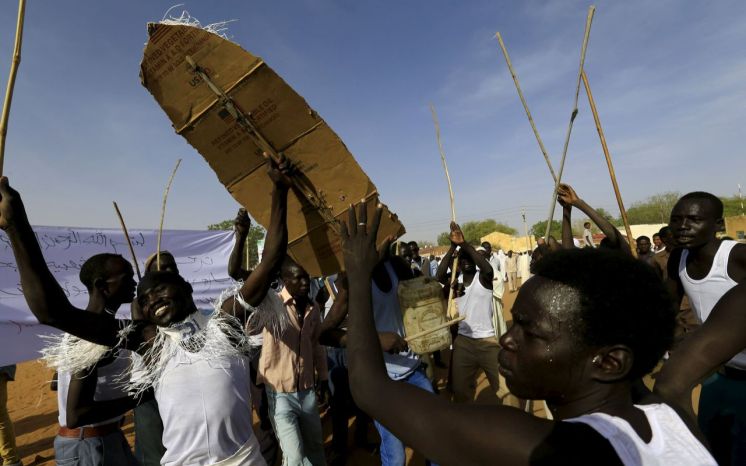Juba seeks Sudan pardon for 25 nationals involved in Darfur conflict
April 8, 2016 (KHARTOUM/JUBA) – South Sudanese government on Friday said it has pleaded for intervention of Sudanese President Omer al-Bashir to use his authority as the head of state to pardon the jail terms and death sentences of 25 South Sudanese accused of fighting alongside rebels in Darfur region.

“We are speaking to the Sudanese authorities to see into it that these citizens are released. We are asking the Sudanese president in particular to intervene in this matter and we hope he would respond positively,” said acting foreign minister, Peter Bashir Gbandi.
“We know he would do because Sudanese people and President Omer al-Bashir in particular is a compassionate person,” he said when he was reached by Sudan Tribune on Friday.
Gbandi was reacting to a question asking what the authorities in Juba were doing in response to the decision of a Sudanese court which on Thursday sentenced 22 South Sudanese to death by hanging and others for life in prison.
The circumstances under which the South Sudanese nationals committed crimes remained a legal row.
Sudanese authorities say they are punished because of their participation in the war waged against the Sudanese government by the former rebel Justice and Equality Movement of Bakhit Dabajo (JEM-Dabajo) which signed a peace deal with the Sudanese government in April 2013.
In line with the security arrangements agreement, the combatants of the Darfurian group were disarmed and gathered in different camps in Darfur region ahead of their demobilization or integration in the Sudan Armed Forces (SAF).
According to Sudanese authorities, the 25 South Sudanese nationals were later discovered by SAF inspectors and arrested last February because of their nationality.
The 22 sentenced to be hanged were convicted of a range of offences including waging war against the state, undermining the constitutional order and on terrorism charges.
South Sudan’s foreign minister told Sudan Tribune during an exclusive interview that he was optimistic the Sudanese government would release its nationals, saying they understand the circumstances under which the victims became part of the rebels.
In a separate interview with Sudan Tribune on Friday, South Sudanese Ambassador to Sudan Mayen Dut Wol, said that he has started talking to the Sudanese government on behalf of his government in Juba after receiving directives from the South Sudanese President, Salva Kiir, to understand the context of the sentence and to seek the intervention of the Sudanese president to reverse the decision.
“We are in contacts with their families and the Sudanese authorities. I have spoken and held talks on behalf of our government and particularly His Excellency, Salva Kiir Mayardit, President of the Republic of South Sudan, who has been following this matter keenly. He asked me to follow [up] the case and brief him on every single step in the process,” Wol said.
“Now I have held talks with relevant officials and institutions here in Khartoum about this matter,” he said.
He further emphasized that President Kiir had asked the intervention of “his brother”, Omer Hassan al-Bashir to pardon the accused.
Wol further explained that after talking with his Sudanese counter-parts they underlined that any intervention from higher level would only happen after legal processes are completed.
“So we are waiting and following up with legal matters,” he said.
Ambassador Wol revealed that the embassy is working hard with the lawyers of the victims to appeal the judgement
He also expressed optimism that the victims could be released because they were conscripted by the Sudanese rebels who were pardoned by the Sudanese president in accordance with the Doha Document for Peace in Darfur (DDPD) which benefited all those who fought as part of the group.
“I am optimistic these brothers will be released. There are reasons why I believe they will be released. The Sudanese government harbours no ill intentions against South Sudanese. They have opened their borders to our citizens to come and allowed some of our citizens who did not want to go after our secession to stay,” he assured.
He also admitted that there are differences between South Sudan and Sudan, which he said were political issues, adding that the 2012 Cooperation Agreement between the two neighbouring countries is one of the mechanisms the two nations could use to resolve differences.
But he said the South Sudanese nationals were conscripted by the Darfurian rebels and did not decide to join. Some of them, he added, were kidnapped and forced to join.
“Another important reason why I believe they would be released is that Sudanese government had signed a peace agreement with the rebel group which conscripted these innocent people and this agreement allowed the Sudanese president to pardon the rebels and now all the members of this rebel group have been pardoned. They can also be pardoned as part of this group because they were not fighting as a different group. The fourth point is that they were part of this group before the secession and so they were conscripted by this group as Sudanese citizens and not South Sudanese,” explained Wol.
Relations between the two countries are at times characterized by accusations and counter-accusations that rebels of either country are supported by the other.
JEM Dabajo officials were not reachable for comment. However, Sudan Tribune learnt that the group leadership is considering ways to secure their release.
(ST)
